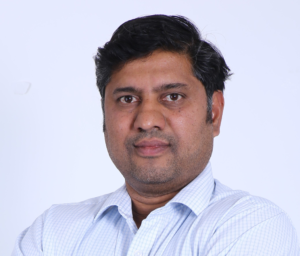Like any other country, India finds itself in an extraordinary situation today. As the pandemic rages on, the vaccine still elusive, life still has to go on, economies still have to function. Amidst all this bruhaha, lightning fast digital connectivity would be welcome. That’s why 5G is a much awaited technology.
Where does India stand regarding 5G? While Reliance Jio declared its ambition to create 5G from scratch, media speculations say that’s unlikely. What is likely is that they go for ‘a mix of buy and build’.
India does possess an emerging ecosystem of companies that specialize in network equipment and software, which includes names like SignalChip, Saankhya Labs, Tejas Networks, Sterlite Technologies, VVDN Technologies, among others. The technology that these companies are building can be a part of India’s very own 5G network stack.
The Tech Panda spoke to Parag Naik, Co-Founder and CEO, Saankhya Labs, a premier wireless communication and semiconductor chipset company, which is working on developing 5G technology.

Parag Naik
Given the current geo-political situation, it is imperative that we develop homegrown 5G solutions
Naik says that India must have its own 5G technology and companies like Saankhya Labs can make them to be used by mobile network operators to setup their 5G networks.
“The Prime Minister has given a clarion call for Atmanirbhar Bharat. Given the current geo-political situation, it is imperative that we develop homegrown 5G solutions. Some mobile operators are already working on using indigenous solutions for 5G implementation,” he says.
Saankhya Labs have already started working on the design and development of 5G Radio products and have also started investing in some future looking 5G product offerings. They are focusing on building a 5G Radio Access solution based on Open RAN.
“We foresaw the ‘Software defined’ long before the industry did and are well placed to execute on 5G with our core offerings being in the Radio Access Networks or RANs. Saankhya Labs has embarked on a journey of making cutting edge 5G RAN solutions for the global market,” he adds.
Saankhya’s Plans for 5G Network Solutions in 2021
Saankhya Labs are working on developing an Open RAN based cognitive scalable 5G RAN solution which includes Multi Band Remote Radio Units with advanced analytics capabilities and a RAN Intelligent Controller platform. It will help in optimization of the spectrum usage.
“Our 5G Remote Units will be available from Q1 of 2021. We are in discussions with some US based customers and partners to take our product into the US market. We also provide radio units and chipsets (current and future) for vRAN based deployments,” Naik informs.
5G Broadcast and Cognitive RAN
In addition, the company is at the forefront of developing a concept called ‘5G Broadcast,’ which is basically a convergence of broadband and broadcast networks.
“This is ideal for India, where operators have smaller spectrum holding but end up carrying a lot of video traffic. We at Saankhya Labs have developed chipsets as well as hardware and software for this solution,” Naik says.
Read more: Work From Home is Leading to the Democratization of IT Within Organizations
They have also pioneered a concept called ‘Cognitive RAN’ that allows ML techniques to be applied to RANs and improves capacity and reduces op-ex for operators. This is a patented technique, which is currently under development. Saankhya has around 65 international patents on various aspects of the technology.
Future 5G Trends
There are several trends that Naik predicts we will be seeing in the near future within the realm of 5G. This includes open and digitized networks, which breaks vendor lock-in and promotes a Linux like model in the hardware world. He also talks about dis-aggregation.
“The operators can build networks through Lego like blocks coming in from multiple smaller vendors instead of relying on one big vendor for end to end solutions. This will give them higher flexibility,” he explains.
Another trend to be seen will be virtualization, which involves running network components as software components on generic hardware. He also speaks about cognition.
“Networks are getting intelligent and respond to their radio environment dynamically. This allows better responsiveness and higher capacity,” he says.
Rural Connectivity
In India, rural connectivity has challenges on both the supply and demand side. On the supply side, there is a need for telecom equipment to operate off-grid and provide large coverage areas while being easy to install. In addition, says Naik, the overall costs of such equipment need to be low. On the demand front, users aren’t willing to pay more but want high speed internet.
Over the years, we have expanded our portfolio from being just a semiconductor company to developing end to end wireless communication solutions
Saankhya’s solutions include the world’s first FCC certified IEEE 802.22 TVWS solution for rural broadband connectivity. They provide smart offload solutions along with traditional connectivity. Their fixed wireless access solution addresses all of the above issues and can provide high speed last mile internet connectivity to every village in India.
“The solution utilizes the UHF spectrum to provide connectivity from a Fiber POP to the village. It is Made in India and very cost effective operating off solar power without the need for a power connection. Depending on the terrain, the range of the system is up to 15 KM,” he says.
Driven by Innovation
Naik is a serial entrepreneur with over 28 years of industry experience. In fact, he has spent 20 years of his career with high tech startups, including Smart Yantra and Vayavya Labs, which were founded by him. He has more than 40+ international patents to his name. He started Saankhya Labs 13 years ago and became India’s first fabless semiconductor solutions company.
“Over the years, we have expanded our portfolio from being just a semiconductor company to developing end to end wireless communication solutions,” he says proudly.
Read more: ‘Owing to Its Unique and Intelligent Application, the Demand for IoT Appliances in India is Growing’
They developed the world’s first production Software Defined Radio (SDR) chipsets.
“We have designed and developed a full spectrum of next-gen communication solutions that are powered by our award-winning, patented, ultra-low power consumption, fully programmable SDR chipsets. They include products and solutions for broadband, satellite and broadcast applications, rural broadband connectivity, satellite communication modems for IoT applications and multi-standard DTV modulators and demodulators,” he says.











